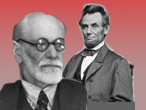Political leaders often are seen at disasters, if they are weather related or not. To viewers uninvolved, this often seems hollow, cynical, a chance to gather a few votes. It is similar to the feeling many get when a political leader dons a hard hat to show how similar he is to workers. However, for those involved in the disaster or who wear hardhats, the leader’s active role is appreciated.
Of course, if a leader is not present or supportive, he is seen in clearly negative terms, at least by the press. He doesn’t care. He is insensitive. So, if he goes to the disaster site, he risks being seen as cynical or manipulative by the voters, and if he stays away, he is seen as callous. What is a political leader to do!?!
This is another case, of course, of emotion over logic. After all, what can the leader do, really? He or she can call in help, but that’s about all. So why is it important, and how can the leader gain from it rather than lose?
The answers lie in knowing who the leaders are in the minds of followers, or even citizens of the opposite party. Unconsciously, i.e. in ways we are unaware of, leaders are looked to as parents. So, when leaders are not parental, they are not seen as leaders. Sibs, maybe, but not parents. Bosses, maybe, but not leaders.
Well, now, what does it mean to be seen as parental? Our parents are all so different, right? Right and wrong. We use what is called transference to have expectations of leaders. We transfer our expectations of our parents onto others, especially others in parental roles. That is, if our parents picked us up when we were hurt, or knew just what to do when we thought we were in danger, we expect others, especially parent figures, to do the same.
Remember, the unconscious mind is formed very early in life, perhaps beginning at age 1 or 2. There is no logic then. Perceptions are not detailed or even accurate. Overall, however, when most of us were 1 to 5 years old, we saw our parents as powerful, caring, all knowing. Because we came to expect that of our parents, we now, as adults, expect it from our leaders.
At the adult, conscious level, of course, we know there is little a president or governor–or parent–can do in all too many cases. It doesn’t matter, however. It is our unconscious working. So, when a president doesn’t meet the god-like expectations of our unconscious minds, we don’t feel he or she is much of a leader (parent).
So, again, what is a leader to do? Well, act parental. Be at the crisis to show you care–just like a parent would. Don’t look unsure. Look calm. Cool, calm, and collected, just like we perceived our parents to be, when we felt endangered. Direct traffic. That is, be seen telling people what to do. These are the sight-bites that will make the viewers, whether those in the disaster or those watching on TV, perceive you as parental, a leader, someone who’ll take care of them.
Oh, those words, “Take care of”. That’s what parents do, right? We’ll get into that more in another post.

 Can you immagine how the political ideas and aspirations envisioned by Abraham Lincoln and the exploration of the psychological mind explored by Sigmund Freud can be seen as one entity?
Can you immagine how the political ideas and aspirations envisioned by Abraham Lincoln and the exploration of the psychological mind explored by Sigmund Freud can be seen as one entity?